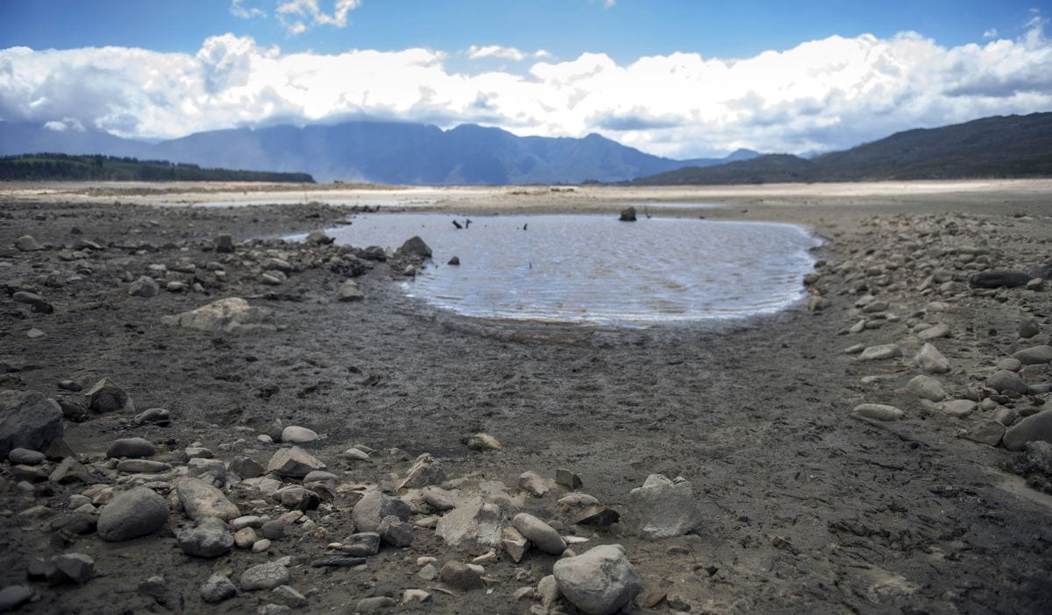Cape Town, South Africa, will run out of water in less than 90 days. That chilling fact may have finally hit home for residents who are now limited to using 11 gallons of water a day and are being asked to avoid flushing toilets whenever possible.
A severe drought coupled with a population that refuses to cooperate in reducing water consumption has led to an event that may be unprecedented in history: a modern metropolis of more than four million people not having access to potable water.
They are calling it “Day Zero” — the day that Cape Town will run out of water. That day has now been moved back to April 12 — at least for the moment. It could slip even further. And experts now fully expect that day to come.
The website of the Western Cape government doesn’t try to sugarcoat the crisis:
We have reached a point of no return. Despite our urging for months, 60% of Capetonians are callously using more than 87 litres per day. It is quite unbelievable that a majority of people do not seem to care and are sending all of us headlong towards Day Zero. At this point we must assume that they will not change their behaviour and that the chance of reaching Day Zero on 21 April 2018 is now very likely.
The people who are still wasting water seem to believe that Day Zero just can’t happen or that the City’s seven augmentation projects – set to produce around 200 million litres per day – will be enough to save us. This is not the case and, while our water augmentation programme will make Cape Town more water resilient in the future, it was never going to be enough to stop Day Zero.
The crisis has reached a new severity, necessitating a series of new emergency measures:
We can no longer ask people to stop wasting water. We must force them. We have listened to the comments of thousands of residents asking for fairness. Council will on Friday be voting on a punitive tariff that will charge residents exponentially higher rates for water usage above 6000 litres per month.
[…]
We will be moving to level 6B restrictions with a new limit of 50 litres per person per day to make up for the many months of missing the 500 million litre per day collective consumption target. The new restrictions will come into effect on 1 February 2018.
The new daily collective consumption target is now 450 million litres per day. This will be in place for 150 days after which the City will reassess the situation. Level 6B restrictions will also limit irrigation using boreholes and wellpoints.
Here’s what residents will be able to do with 50 liters of water a day:
One gallon of water is about 3.8 liters. There are going to be a lot of unwashed people walking around in dirty clothes for the foreseeable future in Cape Town.
The premiere of the region has tried to set a good example:
Ms Zille then offered some suggestions on how to save water.
“Turn off the tap of your toilet cistern and use all of the grey water in your house from washing, save it, and put it into your toilet cistern”, she said.
“No-one should be showering more than twice a week at this stage. You need to save water as if your life depends on it because it does.”
Last year, Ms Zille revealed that she was showering once every three days. “I regard oily hair in a drought to be as much of a status symbol as a dusty car,” she wrote in a column.
As Day Zero approaches, those who can leave Cape Town almost certainly will. But much of the population lives in poverty-stricken slums or shanty towns. People living there do not have running water. They must depend on public facilities for water to do everything.
And when that runs out? A breakdown in civil order is not out of the question as people get absolutely desperate for water. Retailers are stocking up on bottled water, but a city that needs even just 50 million liters a day would be impossible to supply by trucking in Aquafina.
It’s going to be a difficult three months for residents of Cape Town.











Join the conversation as a VIP Member